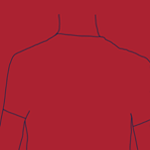Need a Refocus Break?

In this digital world, a lot of us probably spend more time at our desks than we’d like to. Long amounts of time staring at a computer can take a toll! Here’s a few things you can do to give you a physical and mental break.
Take a Stretch Break
Admit it, you’re sitting hunched over your keyboard or phone right now. 😜 Its ok; we all do it. Here’s 3 quick stretches you can do at your desk!

#1 Give Your Wrists Some Love
Being on the computer all day overuses some muscles and underuses others. New York City based physical therapist, Dr. Abby Bales, suggests stretching your wrist flexors and extenders. The easiest way to do this is to hold your arm straight out and bend your wrist up and down at 90 degree angles. Bales says this “prevents the wrist from getting locked in a smaller range.”

#2 De-Hunch
Your upper back and shoulders can lock from being at a desk too long. Dr. Bales suggests stretching by clasping your hands behind your head and squeezing your shoulder blades. This opens up your chest and shoulders, helping stop the hunch.
#3 Big Shrugs

While on the computer most of us have the habit of scrunching up our shoulders and leaning toward the screen. Doing some 3-5 second shoulders shrugs helps! “By actively shrugging and then letting go, the brain is made aware of the unhealthy height of the shoulders,” Dr. Bales said, and it resets accordingly.
Mental Resets
Anytime you disrupt your routine (either by doing little things like pausing to stretch or like, I don’t know, a global pandemic) you have opportunity to reset. What can you do to reset your brain?
#1 Breathe
Pausing and taking a couple deep breathes can help clear your mind, relax, and refocus. It’s as simple as just looking up from your computer or phone and focusing on your breathing for a bit.
#2 Reprioritize
Another thing you can do to mental reset is take a moment to go over your tasks and reprioritize. Ask yourself, “What is my overall goal for the day and what do I need to do next to reach that goal?” It’s critical to understand what tasks are most important. Inevitably things change throughout the day; deadlines move and priorities shift. Reorganizing your task list can help you to stay focused on what really matters and make it easier to adapt to shifting priorities.
#3 Change Up Your Surroundings
Changing something about your surroundings can help you refocus. Can you get up and move? Now that it’s summer, could you work outside? Disrupting your groove gives you the opportunity to reset your focus. Changing where you physically are or even something small like switching up your music is super effective!
What ways have you found to reset your focus and give yourself a physical or mental break?
How to Increase Your Adaptability

If this year has taught us anything it’s that being to react well to inevitability of change is a must-have trait. In venture investor Natalie Fratto’s TED Talk on adaptability, she focused on how we can work on a becoming more adaptable in the workplace.
Here are her three suggestions:
- Be proactive. Fratto says,“Adaptability has to be proactive, not reactive. We have to seek it out, exercise it and flex it like a muscle.” How can you seek out adaptability? Start by looking for gaps in your organization that need filled. For example, is your team having a hard time communicating with the podcast team? Take the opportunity to learn about podcasts and help bridge the communication gap. Putting yourself in a position to help can make it easier to adapt to new roles later.
- Look at things from another point of view. Being agreeable can actually be the opposite of adaptability. Occasionally (and respectfully) playing the devil’s advocate can help you and your team see things from a different viewpoint. This can prevent you from getting to attached to your opinions or view. Not being stuck to ideas promotes flexibility and creativity.
- Remember the times you changed your mind. “It’s helpful to write down the times where you were wrong, changed your mind, or made mistakes,” says Fratto. Instead of viewing the times you’ve made mistakes as negatives, view them in a more positive light. Focus on what you learned and how you were able to grow.
What ways have you had to adapt this year?
